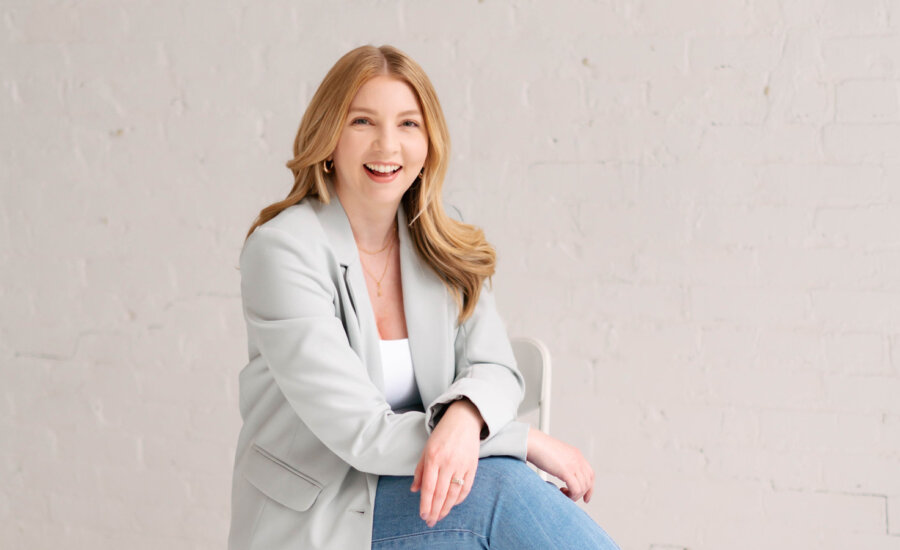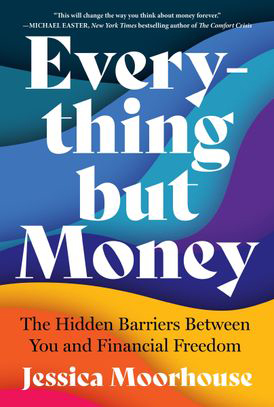Everything But Money excerpt: How much money do you need to not be stressed out?
In her new book, Jessica Moorhouse goes beyond the budget and gets to the root of our relationships with money and finances.
Advertisement
In her new book, Jessica Moorhouse goes beyond the budget and gets to the root of our relationships with money and finances.

As author Jason Vitug pointed out in his book Happy Money Happy Life, “[w]hile money can buy happiness” in the form of housing, food, clothing, health care, necessities and a few luxuries too, “money isn’t happiness.” Sadly, I think that’s something most of us have lost sight of.
Let that sink in for a moment: money is not happiness.
Why are these four little words so significant?
Because they are contrary to everything social media, advertising and Hollywood are trying to make you believe. From seemingly all angles, we are being convinced that money is the path to never-ending bliss—if only you buy these clothes, this car, that house, and have a certain amount of money in the bank.
But that’s just not true.
The joy you get from making a purchase or seeing multiple zeros in your account only last for a moment. There’s a limit to how much happiness money can provide.
For example, a 2018 study out of Purdue University found that for individuals, “the ideal income point is $95,000 for life satisfaction, and $60,000 to $75,000 for emotional well-being.”
Since inflation has increased the cost of living dramatically since this study was published, that would look like $113,000 and $71,000 to $89,000 respectively in 2023 dollars.
However, because this study took data from 1.7 million individuals around the world, it also acknowledges that depending on your particular city’s cost of living, your satiation point may be different than these numbers.
“If you’re already unhappy, money alone can’t fix you.”
Nevertheless, what I thought was most interesting about this study was it found that if you surpass these thresholds, your life satisfaction and emotional well-being can actually start to decline. Once you hit your ceiling, you start to fixate on things like social comparison (i.e., how you stack up next to the Joneses) and acquiring more material gains (e.g., more money, more stuff). In other words, you become propelled by the belief that others are doing better than you, so you need to get more to keep up, making your life satisfaction recede.
In a related 2023 study by psychologists Daniel Kahneman and Matthew Killingsworth, they pitted their opposing theories against each other in an adversarial collaboration to see if happiness did, in fact, plateau at a certain income level.
In 2010, Kahneman famously theorized that emotional well-being did not increase above an income of $75,000 a year, whereas a decade later, Killingsworth argued that it could. After surveying a new crop of participants, they ended up discovering together that although happiness could increase with more money, there was a ceiling for fending off unhappiness.
If you’re already unhappy because of heartbreak, bereavement, clinical depression or “other miseries,” such as trauma or experienced discrimination, money can diminish your suffering only up to $100,000 a year but not much beyond that.
As Killingsworth shared about these findings, “this suggests that for most people larger incomes are associated with greater happiness . . . [but the] exception is people who are financially well-off but unhappy.
For instance, if you’re rich and miserable, more money won’t help. For everyone else, more money was associated with higher happiness to somewhat varying degrees.”
Here’s what all these studies tell me: First, no matter what, if you don’t have enough to cover your basic needs, more money is undeniably the solution to that problem. This always reminds me of a classic Friends exchange where Ross says, “I just never think of money as an issue,” to which Rachel responds, annoyed, “That’s because you have it.”
When you have enough money, it stops being an issue. It can, however, move the spotlight over to your other issues. As Vitug put it in his book, “money fixes money problems, but it isn’t the answer to life problems.”
As I said at the start of this book, there’s a reason why there are so many miserable millionaires and billionaires out there. There’s also a reason why I’ve met so many people in the FIRE community who successfully amassed a seven-figure nest egg, only to realize they were still unhappy after they retired early.
“There’s a limit to how much happiness money can provide.”
If you’re already unhappy, money alone can’t fix you. No wonder why my level of happiness (or unhappiness) remained unchanged despite how much my income or net worth grew over the years. Like so many others, I was under the illusion that money was some magic cure-all for all my emotional problems, and I just needed a little bit more for the medicine’s effects to kick in.
Unfortunately, just as hordes of people discovered after buying miracle tonics from charlatans in the 1800s, there’s no cure in that bottle—just a bunch of mineral oil, animal fat, turpentine and red pepper.
As life-changing as money can be, what it can’t do is erase your pain and hurt on its own. Only you can make that change through some of the healing practices we explored in the previous chapter (which money can help pay for), but also by taking your life into your own hands. This requires you to rid yourself of the idea that happiness is a number and realize that it’s something you must define for yourself.
That’s why we need to stop asking ourselves questions like “How much money would make me happy?” and instead start asking, “After all my basic needs are met, what would make me happy?” That’s what we’ll be exploring in this last chapter. The final step to letting go of your toxic relationship with money so you can replace it with a much healthier one is to define your personal happiness outside of money. Only then can you figure out how money can help you achieve it. This is what financial fulfillment is all about. Using money as a means of finding fulfillment in all aspects of your life, body and soul. Money is just a tool, after all. You’re the hand that wields it.

Excerpted from Everything But Money: The Hidden Barriers Between You and Financial Freedom by Jessica Moorhouse. (HarperCollins, 2024). Read her My MoneySense profile: “Jessica Moorhouse on asking for a raise and what she’d do if money were no object”.
Share this article Share on Facebook Share on Twitter Share on Linkedin Share on Reddit Share on Email
Great content here, thank you!
I really liked the quotes like “Money fixes money problems” and “Money isn’t happiness”.
Looking forward to reading your book.